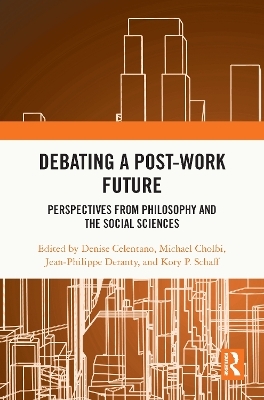
Debating a Post-Work Future
Routledge (Verlag)
978-1-032-34212-2 (ISBN)
The book provides a comprehensive, critical overview of philosophical, social-scientific, and humanistic arguments about the design and desirability of “post-work” society. Its purpose is to clarify the concepts and theories that inform this debate by exploring the diversity of arguments from a wide range of perspectives about the meaning of a “post-work” future.
The book’s 12 chapters were written exclusively for the volume by an international team of researchers in philosophy, political science, gender studies, law, sociology, history, and engineering. They are organized into four larger sections:
I. Defining the “Post-Work” Debate
II. From Past to Future
III. The Value and Conditions of Work vs. Post-Work
IV. The Politics and Justice of Post-Work
After a general introduction and then an initial round-table discussion among four leading theorists, the book explores topics like work as an evolving social invention, the possible effects of a shorter work week and UBI, automation, climate change, and the roles of Marxism, capitalism, and democracy in a post-work future.
Denise Celentano is Assistant Professor of Ethics and Political Philosophy at the Université de Montréal. Her main research area is contemporary political and social philosophy, with a focus on the philosophy of work and particular attention to social inequalities and technological change. Michael Cholbi is Professor and Personal Chair in Philosophy at the University of Edinburgh. His research on work and labour includes “The Desire to Work as an Adaptive Preference” (Autonomy, 2018), “The Duty to Work” (2018), The Future of Work, Technology, and Basic Income (Routledge, 2019), “Justice in Human Capital” (in Working as Equals, 2023), as well as “Philosophical Approaches to Work and Labor” in the Stanford Encyclopedia of Philosophy (2022). He teaches one of the only courses worldwide devoted exclusively to ethical questions concerning work and labour. Jean-Philippe Deranty is Professor of Philosophy at Macquarie University (Sydney). He writes on critical theory and the philosophy of work. His recent publications include (with C. Dejours, E. Renault and N. Smith), The Return of Work in Critical Theory (2018). Kory P. Schaff is Senior Lecturer of applied ethics in the Ethics in Engineering and Technology program in the College of Engineering, Computer Science, and Technology at California State University, Los Angeles. His research focuses on the ethical and economic dimensions of work, technology, and sustainability. He is the co-author of Ethics in Engineering for a Sustainable Future (2024) and editor of Fair Work: Ethics, Social Policy, Globalization (2017) and Philosophy and the Problems of Work (2001).
Introduction; I. Defining the “Post-Work” Debate: 1. Envisioning the Post-Work World: A Roundtable Conversation; II. From Past to Future: 2. A History of Work as Lived Experience; 3. The Post-work Imagination; 4. Climate Change, Automation, and the Viability of a Post-Work Future; III. The Value and Conditions of Work vs. Post-Work: 5. Self-Development and Shorter Working Hours; 6. Work and the Work Ethic: A Critique of Postwork Arguments; 7. What Is the Point of “Post-Work”? Withdrawing vs Transformative Conceptions; IV. The Politics and Justice of Post-Work: 8. Communism Should not be Post-Work; 9. Post-Work as Post-Capitalist: Economic Democracy for a Post-Work Future; 10. Get a Democratic Life: Politicizing Post-Work Critiques and Democratic Theory; 11. Post-Work and the Problem of Recognition: A Defence of Working Time Reduction; 12. How to Pay for a Post-Work World: Automation and Collective Property; Index.
| Erscheinungsdatum | 13.06.2024 |
|---|---|
| Zusatzinfo | 2 Tables, black and white; 2 Halftones, black and white; 2 Illustrations, black and white |
| Verlagsort | London |
| Sprache | englisch |
| Maße | 152 x 229 mm |
| Gewicht | 453 g |
| Themenwelt | Geisteswissenschaften ► Philosophie ► Ethik |
| Sozialwissenschaften ► Soziologie ► Makrosoziologie | |
| Wirtschaft ► Volkswirtschaftslehre ► Makroökonomie | |
| ISBN-10 | 1-032-34212-9 / 1032342129 |
| ISBN-13 | 978-1-032-34212-2 / 9781032342122 |
| Zustand | Neuware |
| Haben Sie eine Frage zum Produkt? |
aus dem Bereich


